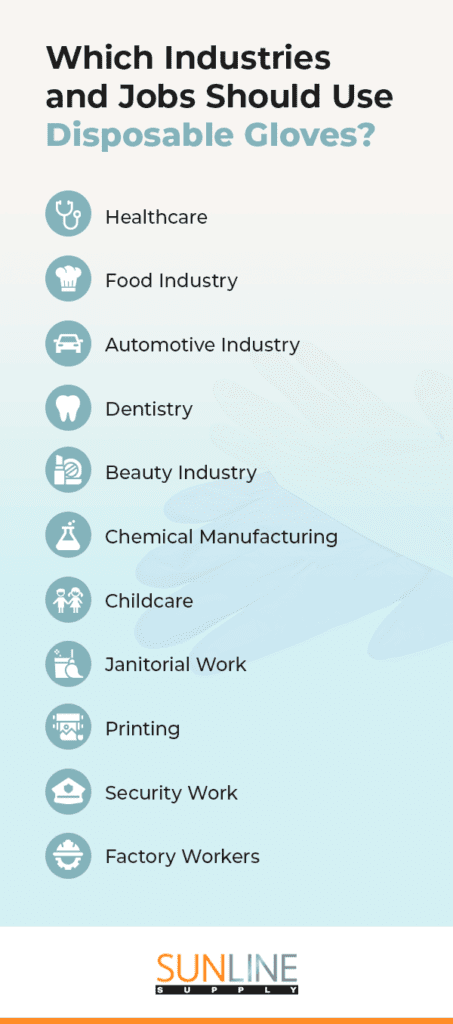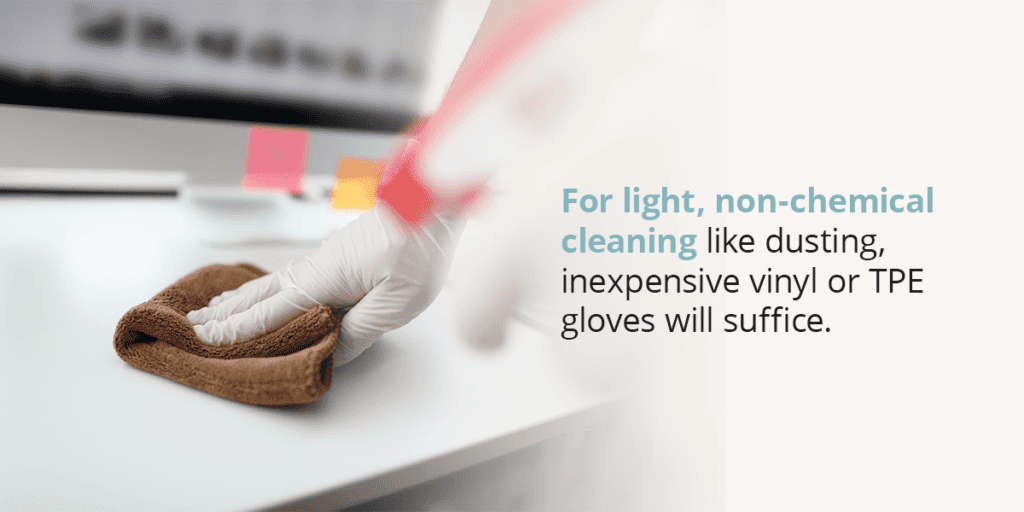
Types of Disposable Gloves
Disposable gloves offer both convenience and protection to workers in many industries. From comfortable, inexpensive and easy-to-change gloves for food preparation to highly specialized gloves to protect those working in chemical manufacturing, disposable gloves have many applications. They have also benefitted from recent technological advances, making them stronger, more practical and more cost-effective, especially when purchased in bulk.
When to Wear Disposable Gloves
The applications of disposable gloves are as varied as the people who use them. Some of the situations that require or benefit from using disposable gloves include:
- When the wearer will come into contact with chemicals or skin irritants.
- When the wearer will come into contact with bodily fluids like blood, vomit, urine, feces or mucus.
- To protect others from bacteria or microbes on the wearer’s hands.
- When handling substances that can stain hands.
- When handling items that can be damaged by oils on the skin.
- When handling unknown or undefined items.
- For protection against burns, cuts, abrasions and similar injuries.
- For general hygiene, comfort or personal preference.
You should wear nitrile gloves or gloves made from a similar synthetic material, such as vinyl, when there’s a risk that a fellow employee, customer or client could be allergic to natural rubber. For some, even touching an object that someone wearing latex gloves touched can trigger an allergic reaction.
Types of Disposable Gloves
For many industries, disposable gloves made from the most common materials are appropriate and provide adequate protection:
Nitrile
Nitrile is a synthetic, processed form of natural rubber. After it goes through a rigorous process, the rubber proteins are transformed, making nitrile safe for those with latex allergies. Uses of nitrile gloves are virtually endless because they are waterproof and resistant to punctures while providing other benefits. They also protect against contaminants including fungus, pesticides, commercial cleaning products and biologicals. Additionally, they provide a barrier for employees handling fragile items like electronics, glass, paper and other objects that could break and cause injury.
Nitrile gloves are available in medical and non-medical grades, and they come in a range of sizes, colors, thicknesses and textures. Applications of nitrile gloves exist in businesses from tattoo parlors to laboratories to childcare centers. They are one of the most versatile disposable gloves.
Vinyl
Vinyl is a synthetic, protein-free, non-biodegradable material made from polyvinyl chloride (PVC) and plasticizers. By incorporating the plasticizer with the PVC, vinyl gloves become thin, flexible, comfortable and soft to the touch. Another advantage of vinyl gloves is their affordability, making them a popular choice in fields with high glove turnover. Vinyl gloves are also often loose-fitting and easy to change.
TPE
TPE stands for thermoplastic elastomer, a product from a group of rubber-like materials that combine the best qualities of rubber and plastic. TPE gloves are a more sustainable option since they can be recycled. TPE gloves are also waterproof, nontoxic, lightweight, strong and comfortable. They’re an excellent choice for eco-conscious food service workers, those in the beauty industry, childcare workers and single-use medical examinations.
Latex
Latex gloves were once the gold standard in disposable gloves for many industries. Latex, made from natural rubber, possesses many qualities that explain this preference. Some users swear by its tactile sensation, flexibility and dexterity. One limitation of latex is that many people experience allergic reactions to it or develop reactions over time. Latex gloves have been banned in some states because of these allergic reactions.
The Best Gloves for Different Industries

Which industries and jobs should use disposable gloves? They should be used in any situation where a barrier for the hands is necessary. For some sectors, gloves are a legal requirement, and for others, they enhance the comfort and hygiene of workers and clients alike. Different sectors have very different needs for personal protective equipment (PPE), and gloves are no exception. Some of the industries where you need to wear nitrile gloves or other disposable gloves include:
Disposable Gloves for Healthcare
One of the most important things to remember about gloves used in most healthcare settings is that they are considered medical devices and regulated by the Food and Drug Administration (FDA). Medical gloves can include surgical gloves, examination gloves or gloves for handling chemotherapy agents.
The FDA advises medical and healthcare workers to wear disposable gloves any time they might come into contact with a patient’s bodily fluids, such as blood, vomit or urine, or any other possible contaminants. Because many patients and healthcare workers suffer from allergies to natural latex, other synthetic materials like nitrile or polyvinyl chloride (PVC) might be better choices. Be sure you’re purchasing 10K-certified disposable gloves to protect your workers and comply with regulations.
Disposable gloves for handling chemotherapy drugs must meet additional requirements to protect the wearer.
Disposable Gloves for the Food Industry
In food service, protecting workers from bacteria in raw meats and other ingredients is just as important as protecting patrons from germs and microbes that might be on workers’ hands. Those in the food industry must also avoid cross-contamination and must change gloves after handling raw meat, fish and other items before touching a different item. Comfortable, loose-fitting and affordable gloves like PVC, vinyl and TPE make these changes quick and easy. Food service workers should change their gloves if:
- They’ve worn them for over an hour.
- Gloves are punctured or torn.
- Gloves are soiled.
- Workers have handled hot peppers or spices they don’t want to spread to other items.
- Workers are switching from one food prep task to another.
- They’ve handled ingredients with a high risk of contaminants like raw meat, seafood or raw eggs.
- They are moving from prep work to handling prepared foods.
Because of the frequent changes needed in a commercial kitchen or food service area, some of the best gloves for the food industry are TPE, vinyl and nitrile. Depending on the thickness of the gloves, some even offer protection against common food-service injuries like cuts, abrasions and burns.

Disposable Gloves for Mechanics and the Automotive Industry
Those working around vehicles are likely to encounter harsh chemicals, oil and grease, heat and sharp or rough metal components. Due to recent advances in their manufacture, disposable gloves can help protect against these hazards while also offering the dexterity and tactile sensation needed to perform delicate operations.
Thicker nitrile gloves offer a good level of protection for daily tasks in the service bay, and they’re by far the most durable of the disposable gloves used by mechanics. They stand up well to high temperatures without melting or cracking, and they can withstand gasoline, oil and many other chemicals. A snug fit keeps them in place and avoids accidental chemical contact with the skin.
Vinyl and TPE gloves might also be useful for less rigorous tasks around the garage.
Disposable Gloves for Dentistry
Gloves are necessary for dentists and dental hygienists, who regularly contact saliva, blood and other bodily fluids. Plus, they need to protect their patients from any germs or contaminants on their own hands. Dental gloves fall under the authority of the FDA, meaning they require a 510K premarket certificate. This certificate shows the gloves have been reviewed for biocompatibility, leak resistance, tear-resistance and other criteria. Gloves for dentists should also offer the dexterity needed to perform precision work.
In 2016, the FDA banned powdered gloves because of their high risk of complications when the powder interacts with internal body tissues. Since that ruling, non-powdered gloves have been required in medical and dental settings.
Disposable Gloves for the Beauty Industry
Because of potential contact with contaminants, chemicals and dyes, many in the beauty industry choose to wear gloves for their own hygiene and safety and that of their customers. For stylists, barbers, makeup artists, nail technicians and those in similar positions, disposable industrial gloves provide protection in a non-medical capacity. Beauty professionals have a wide range of choices of color, size, material and price. The industry frequently uses nitrile gloves to avoid the risk of allergic reactions in clients.
Disposable Gloves for Chemical Manufacturing
Gloves are extremely important when workers can be exposed to potentially caustic substances in jobs like manufacturing and petrochemical or oil refining. Some glove materials are resistant to certain chemicals but weak to others. When talking about glove materials and chemical resistance, some crucial terms to know are:
- Permeation: This term refers to chemicals that can seep through the glove’s material, breaching the film without rips or holes.
- Degradation: This term means the material of the glove begins to break down due to contact with the chemical.
The Occupational Safety and Health Administration (OSHA) provides a chart detailing which materials are resistant to which chemicals. The gloves you choose for a particular manufacturing facility depend on which chemicals the gloves must be resistant to. Some examples of the correct glove to use with various chemicals include:
- Aniline: Neoprene gloves provide good protection against aniline. Latex and butyl both provide fair protection. Meanwhile, nitrile latex performs poorly. In this case, neoprene or latex gloves are the best choices.
- Castor oil: Neoprene and butyl gloves perform fairly, while natural rubber or latex performs poorly. Nitrile gloves are rated very good for handling castor oil.
- Diesel fuel: Neoprene gloves provide good protection for diesel fuel, while latex and butyl gloves offer poor protection. Meanwhile, nitrile is rated very good and is the ideal choice when handling diesel fuel.
Choosing which disposable gloves to wear when working with chemicals depends entirely on the chemical involved. Consult OSHA, or contact us at SUNLINE Supply to discuss your needs.
Disposable Gloves for Childcare
Anyone who works in childcare knows it can be a messy business. Employees at daycares and similar facilities will face several situations where gloves are helpful or required during a typical workday. Gloves protect workers while changing diapers, cleaning up vomit or applying first aid to minor injuries. Gloves also protect children from germs on workers’ hands, and they’re useful and necessary when preparing children’s meals or feeding them.
Gloves also come in handy when doing routine cleaning at the facility, and they’re good to have on hand for unpredictable messy situations. Because childcare presents so many circumstances requiring hand protection, it’s beneficial to have various disposable gloves at hand.
Disposable Gloves for Janitorial Work
Janitors, custodians and those involved in commercial cleaning have a twofold reason for using disposable gloves and changing them frequently. First, they must consider the unsanitary items they encounter, like garbage, dirty restrooms and food waste.
Second, they must protect their hands from the chemicals they use in their duties. While diluted cleaning products are not usually toxic, frequent or prolonged exposure can cause skin irritation and dry, cracked hands. For light, non-chemical cleaning like dusting, inexpensive vinyl or TPE gloves will suffice. To protect hands against chemical cleaners or things you’d rather not touch, latex and nitrile provide a better barrier.

Disposable Gloves for Printing
Some of the many chemicals used in commercial or industrial printing include emulsions, inks, oxidizers and solvents. Because their hands are exposed to harsh and irritating chemicals, professional printers often use gloves. The best choices for those involved in printing are either thick, sturdy nitrile or durable latex gloves, provided allergies aren’t an issue.
Disposable Gloves for Security Work
Security guards never know what they might encounter in the course of their duties. They can encounter blood or other bodily fluids, chemicals of all kinds and even sharp objects like knives, needles or other weapons. Security workers might not even know exactly what they might encounter during a security search, so heavy, close-fitting gloves with as many chemical resistances as possible are essential. High-quality nitrile gloves are a good choice due to their ability to resist punctures.
Disposable Gloves for Factory Workers
Much like workers in chemical manufacturing, line workers and those on the factory floor use PPE based on what they’re working with. Almost every factory contains some hazardous materials. For example, if lead, acids, salts or solvents are present, sturdy, high-quality latex or nitrile latex gloves are appropriate.
Shop Disposable Gloves by Industry From SUNLINE Supply
Workers in all fields are entitled to perform their duties without the fear of encountering hazardous materials or even just touching something they’d rather not. Biological contaminants are a risk factor in some industries, and in others, there can be sharp objects or extreme temperatures. In many situations, such as food service, it’s the customer who needs protection from germs. To meet these safety requirements, employers must educate their employees on when to use disposable gloves and have an ample supply at the ready.
Fortunately, the wide selection of gloves on the market today means there’s personal protective equipment for every job and every situation. Disposable gloves offer the ultimate in convenience and safety because there’s no need to clean or decontaminate the gloves and no need to inspect them for damage after use. They’re simply discarded for a fresh, clean and fault-free pair. Buying disposable gloves in bulk makes all that more affordable, too.
SUNLINE Supply offers wholesale disposable gloves for all the industries listed above and many others. View our gloves available by industry or browse our general inventory of disposable gloves and PPE. If you need something specific for your industry or have any questions about which gloves best suit your situation and budget, contact our team using our glove form and learn more about our disposable gloves.


